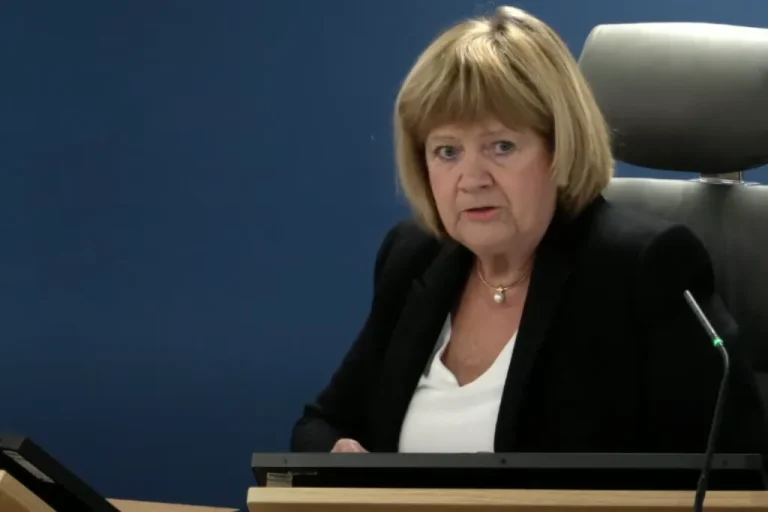Calls have been made to “future proof” the adult social care sector and address disparities between it and the NHS, as a major investigation into the UK’s response to the Covid-19 pandemic resumes.
The extreme challenges faced by social care workers, people receiving care and their families during the pandemic are being investigated, as part of the UK Covid-19 Inquiry.
“We all knew that Covid-19 was everywhere… but to actually knowingly import it into the home was a shift in risk”
Ana
On Monday, the national inquiry into the UK’s response to and impact of the Covid-19 pandemic began oral evidence sessions for its sixth module of 10, this time turning its attention to social care.
It follows the conclusion of evidence being heard on topics including political governance, the impact of the pandemic on healthcare systems, vaccinations and the resilience and preparedness of the NHS in 2019 and 2020.
The inquiry, chaired by Bariness Heather Hallett, heard opening statements from core participants. These include organisations representing the bereaved, care workers, nurses and decisionmakers.
The first to speak was Jacqueline Carey KC, counsel to the inquiry, who laid out that the sessions have eight areas of focus:
The impact on people’s experience of care
The structure of the sector
Key decisions made about the sector
The management of the pandemic in adult and residential homes
Do not attempt cardiopulmonary resuscitation (DNACPR) orders
Changes to inspection regimes
Deaths related to infections
Infection prevention and control (IPC) in social care
Ms Carey asserted that the pre-pandemic state of adult social care was “fragile” and that it “lacked resilience”.
She outlined issues including the discharging of Covid-19-positive patients from hospitals to care homes, local governments struggling to procure personal protective equipment (PPE), a low-paid and overworked workforce and poor testing capacity.
Gerry Boyle, representing the Royal College of Nursing (RCN), told the inquiry his organisation remained frustrated at the lack of a “voice” given to the nursing profession in the early stage of the pandemic, in relation to social care.
Like Ms Carey, Mr Boyle spoke about “years of under-investment” in the social care sector and the impact this had during the pandemic years.
“RCN had consistently highlighted over a number of years the absence of effective workforce planning for nursing,” he said.
“The impact of this feeling was already manifesting itself pre-pandemic, and endures to this day,” stated Mr Boyle.
“Failure by the UK government to tackle these issues facing the nursing workforce in recruitment, retention and burnout remains a serious risk to the country’s ability to robustly tackle future pandemics.”
He warned that the adult social care sector “remains fragile” to this day. He added that the RCN had reiterated calls for all UK governments to implement minimum nurse staffing levels across all sectors and settings, including social care.

Gerry Boyle
Mr Boyle also said there was an “artificial and unhelpful divide” between adult social care and the NHS with “unequal access” to resources and workforce, leading to an “unfair perception” that it was second to acute hospital care.
He suggested this may have been a factor in the decision by governments to allow the discharging of unwell patients into social care, in order to “protect” the NHS’ capacity.
He concluded his evidence by calling for a “future proofing” of adult social care with better resources and staffing.
“Many [RCN members] lost their lives just by turning up for work,” Mr Boyle said. “Many lost their careers through the impact of the pandemic on their mental health.
“Many continue to suffer the effects of long Covid, which has blighted their ability to work and perform the public service they so cherish and which our society so desperately needs.
“These consequences and the inevitable impact on the safety of those they care for should never happen again,” he said.
Counsels Peter Weatherby KC, Brenda Campbell KC, Dr Claire Mitchell KC and Brian Stanton spoke at the evidence session on behalf of Covid-19 bereavement groups from the four UK nations.
The four lawyers told the inquiry how families of those who died with the virus were still traumatised and severely impacted by the memory of not being able to visit their loved ones in care homes due to restrictions, or who were designated DNACPR orders without consultation.
Similarly, Danny Friedman KC, representing various disabled people’s organisations, described the “life-threatening” state of social care services due to the discharge of unwell patients into settings, and criticised the government for having taken the rights of disabled people away in the early stage of the pandemic.
Mr Friedman said that there was a misunderstanding by policymakers and the public about what social care is, with too much of a focus on care homes, and not enough on domiciliary and home care.
This was a sentiment shared in opening statements from counsels representing care workers themselves.
Adam Payter, on behalf of the National Association of Care and Support Workers, called for “parity of esteem” to be given to social care and for the further professionalisation of workers his organisation represents.
Monday’s session also featured a set of moving testimonies by those about whom this module of the inquiry is concerned, including the bereaved.
In addition, it featured impact statements from those working in the care sector, who spoke about the effects of the issues outlined by Ms Carey, such as discharging patients from hospitals who had tested positive for Covid-19.
One statement was from a former police officer, Ana (no surname given), who trained as a healthcare assistant (HCA) so she could see her 89-year-old mother.
The HCA spoke about the high death toll of residents at her care setting, and of the impact of Covid-19-positive patients being transferred from hospitals into the homes.
“We all knew that Covid-19 was everywhere and that a staff member could bring it in from their family, but to actually knowingly import it into the home was a shift in risk,” she said.
“All of us – residents and the staff – were outraged, and none of them could afford to lose their jobs.”
The evidence session concluded with opening statements from the UK, Scottish, Welsh and Northern Irish governments, who each acknowledged the challenges faced by the care sector and briefly outlined their response to the outbreak.

